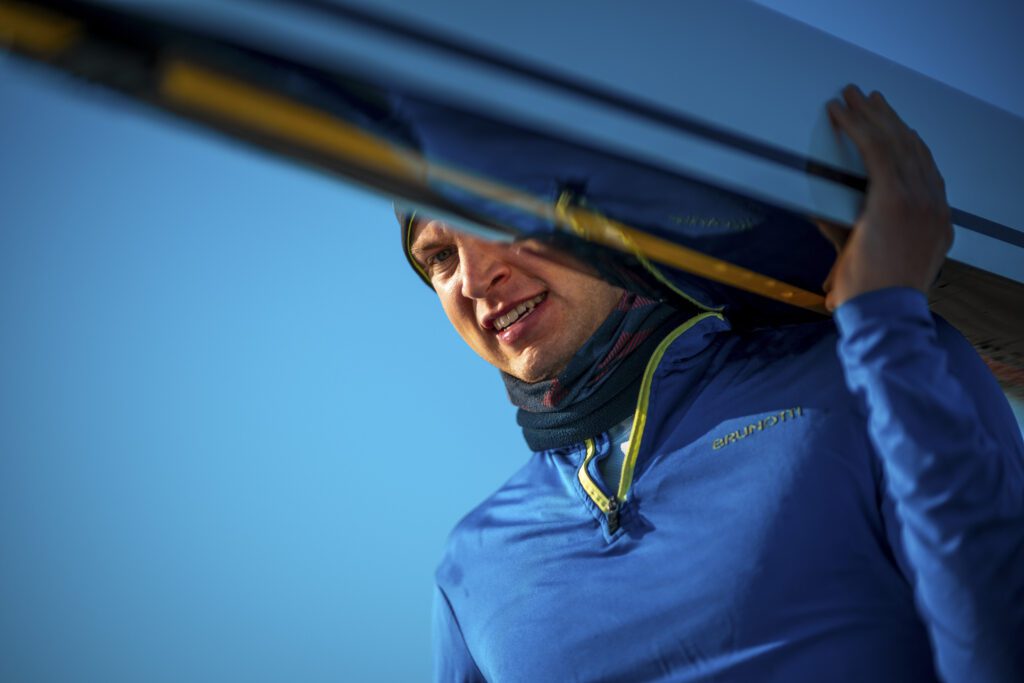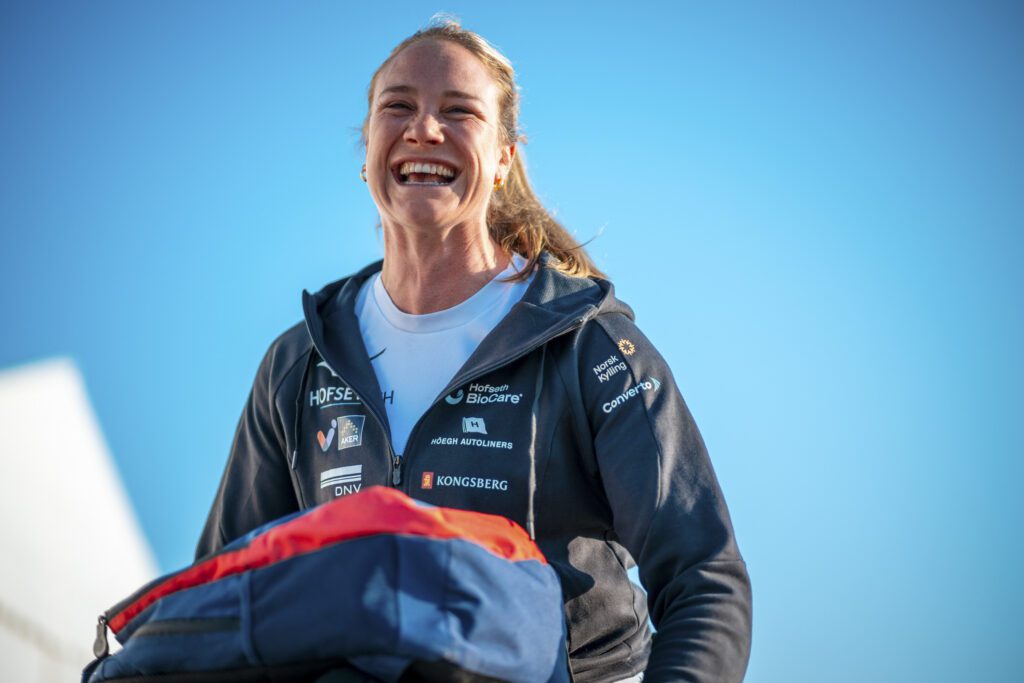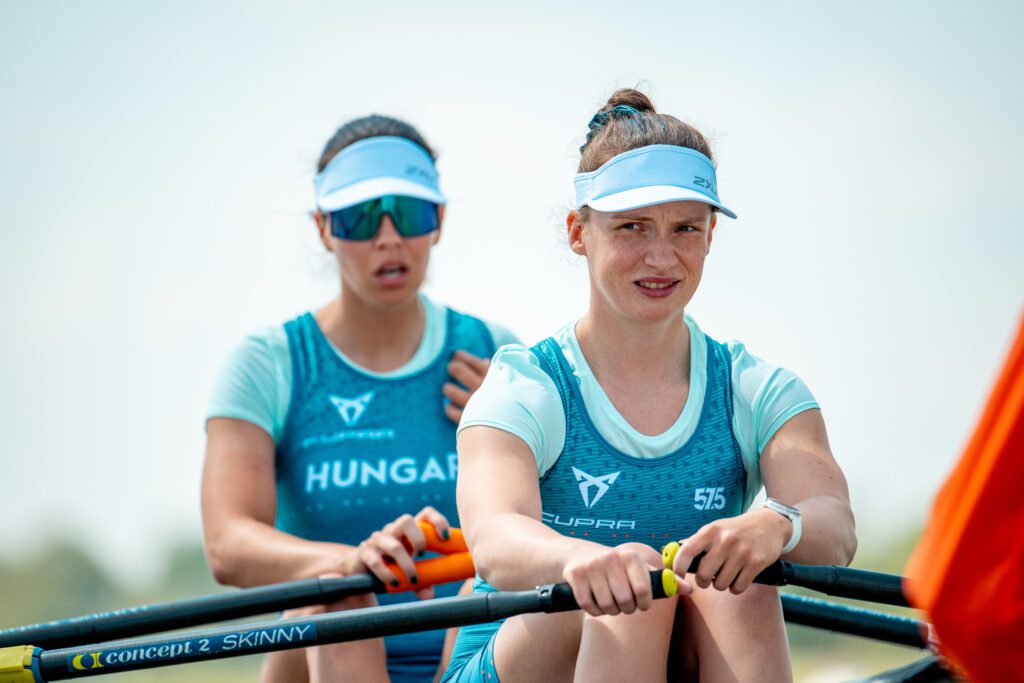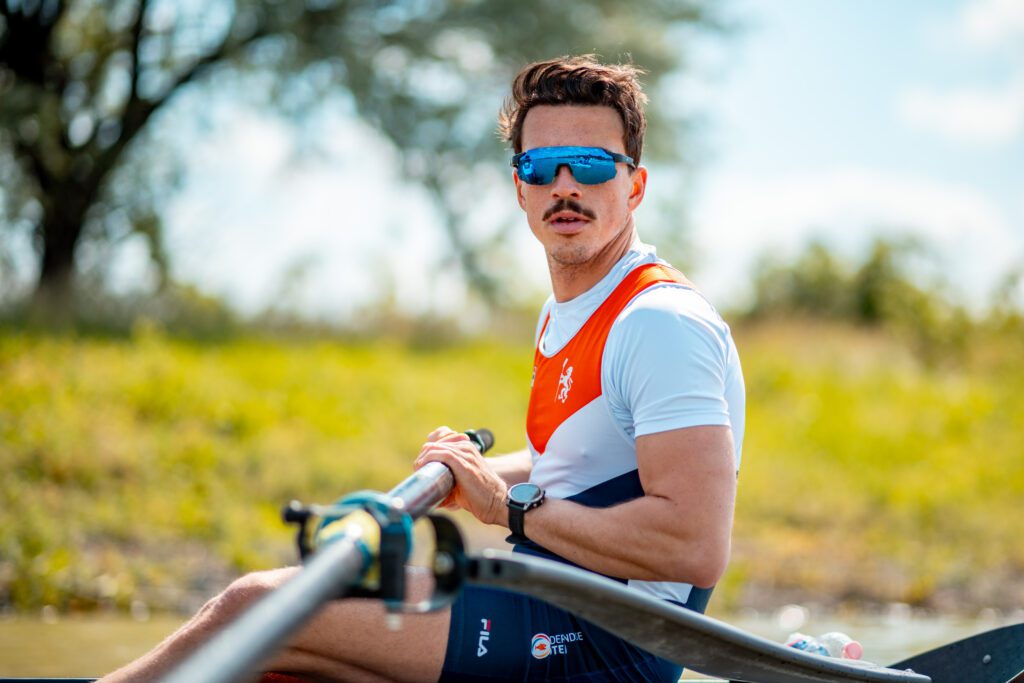The story of the single scullers at the 2019 Poznan world cup ended with four new names on this year’s podiums, as former world champion Emma Twigg (NZL) outsprinted Magdalena Lobnig (AUT) with Carling Zeeman (CAN) third, while Sverri Nielsen (DEN) did a brilliant number on the men’s singles field, and Angel Fournier Rodriguez (CUB) finished a few strokes early to let Pilip Pavukou (BLR) take silver.
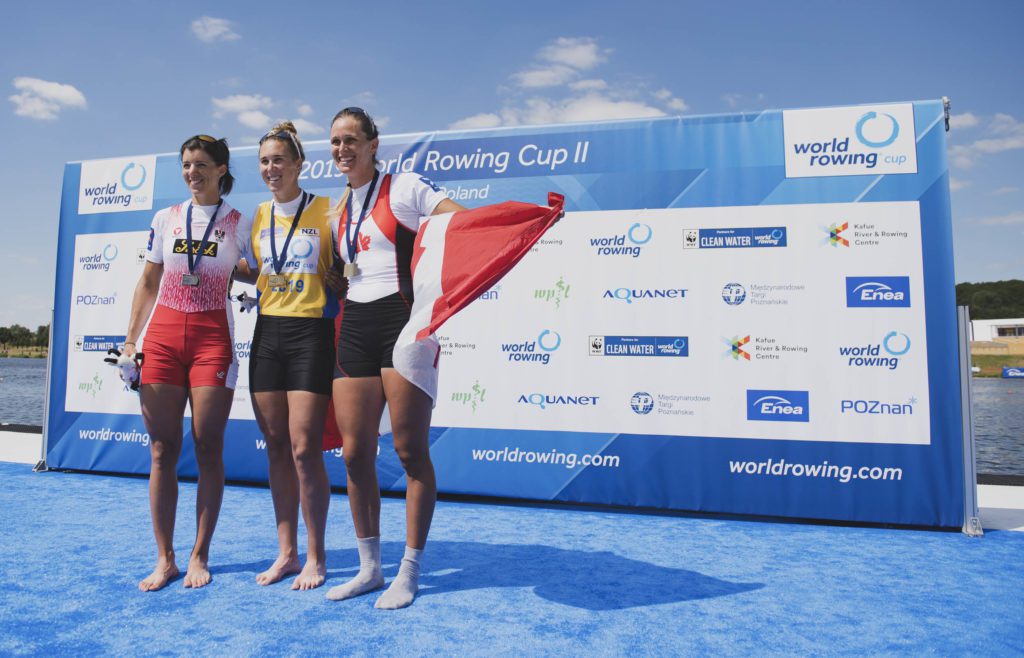
Photo (L-R) Magdalena Lobnig AUT, Emma Twigg NZL, Carling Zeeman CAN // 2019 Poznan World Cup
Credit Benedict Tufnell
Matching her historically unusual timing, Twigg has re-entered the singles game after nearly three years out, and put a Kiwi cat firmly amongst the European pigeons by starting her 15-month Tokyo campaign with a gold. For those who don’t remember, she was 2014 singles champion then moved abroad for a study year (while still training) in 2015, which annoyed the rather hidebound New Zealand selectors enough for them to deny her a place at that year’s worlds. A benighted decision, it led to their other sculler failing to qualify and Twigg having to go to the Final Qualification Regatta in 2016, which is often too strenuous to allow for a good performance at the Olympics a few weeks later. Following Rio disappointment Twigg took two seasons away from the sport, and only restarted competitive rowing this year.
Clearly brushing away racing rust with every stroke, Twigg picked up her first world cup win of the Olympiad with a dash to the line in which she was watching Lobnig like a hawk, and just outpaced her. Behind them Zeeman’s own surge put paid to Kara Kohler’s otherwise encouraging US chances, but the ferocity of this race is one which will have worried absent world champions Sanita Puspure (IRL) and Jeannine Gmelin (SUI) considerably.
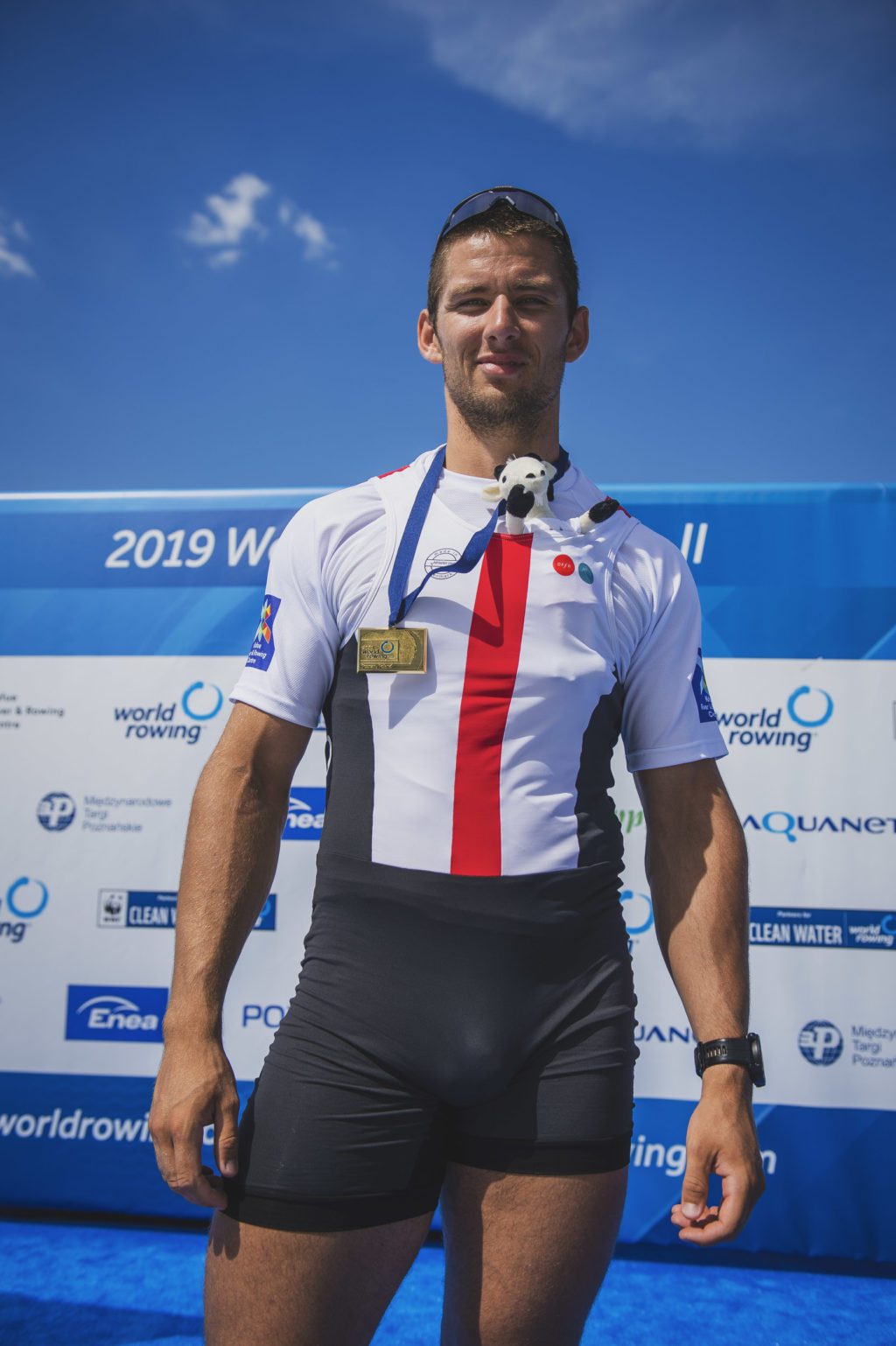
Photo Sverri Nielsen (DEN) M1x winner
In some ways Nielsen’s M1x win was even more impressive, in a final which though lacking Synek and Martin (stayed away), Manson and Griskonis (B-final) was nevertheless extremely high quality. The Dane made like an eight and flew right away from the field within the first 500 metres, at one stage owning nearly three lengths of lead before the charge to the line closed up slightly. Despite European champion Oliver Zeidler’s fine early regatta form, he faded under the combined pressure from Kjetil Borch (NOR), Tom Barras (GBR), Pavukou and Fournier Rodriguez, while the latter two had the best final 500s and went through to take the minor medals. That it was this way round came down to Fournier Rodriguez’ crashing error of stopping just early enough to let the Belarussian surge past for silver: a surprising mistake for the highly experienced Cuban sculler to make.
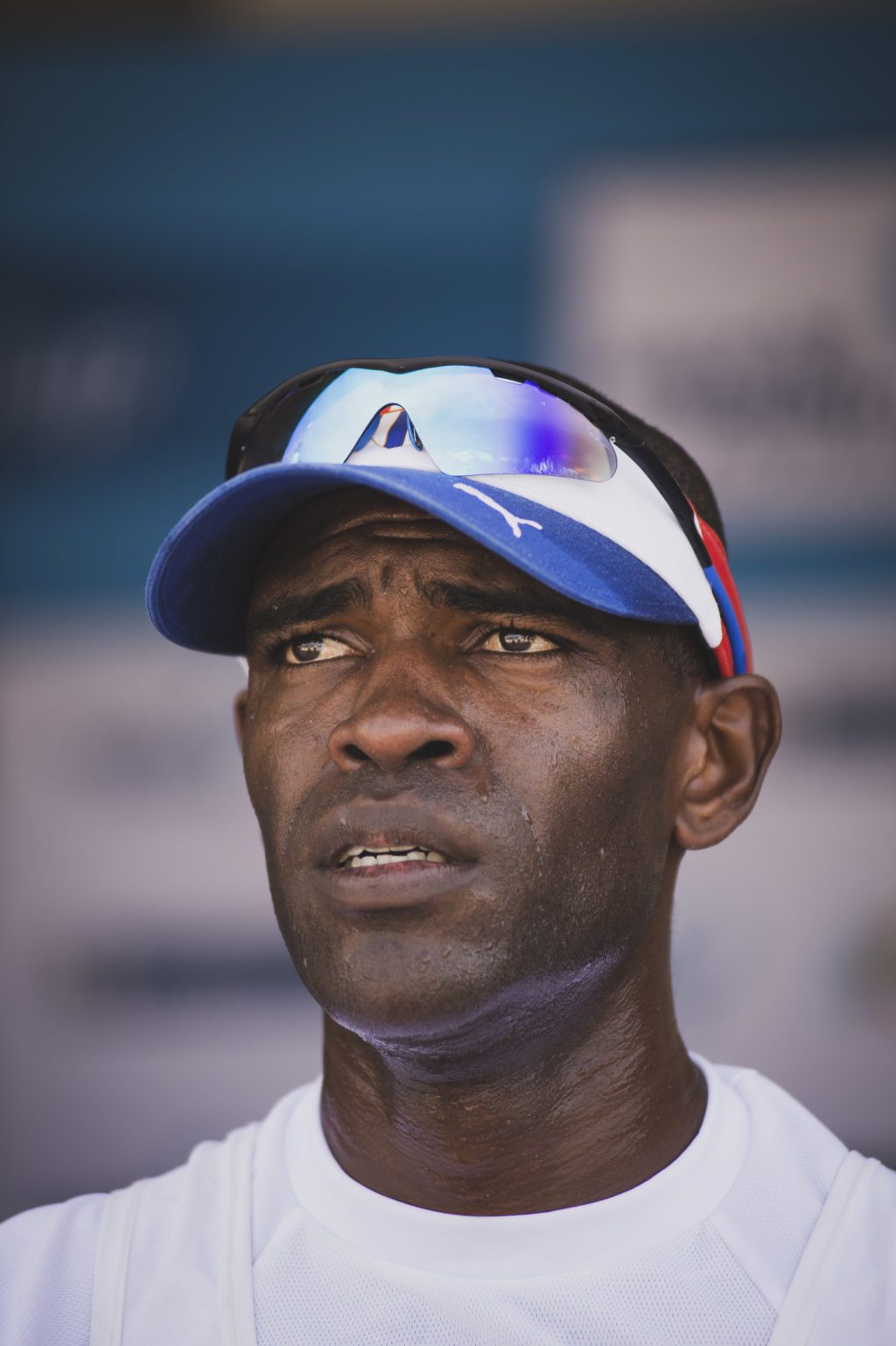
Photo Angel Fournier Rodriguez’ (CUB) error cost him the silver in the M1x
Credit Benedict Tufnell
The singles finals were Australia-free, something of a surprise since the Antipodeans, who topped the medal table, were present causing headaches for the rest of the nations in nearly every other Tokyo category. They came away with three golds, two silvers and three bronzes in Olympic classes, which included wins for their men’s pair and four, and women’s eight. The Aussie W8+ is a cracker this year and played the same game as Nielsen, charging out fast and early enough to give the USA too much to make up, while Britain was the best of the rest in third. A suspicion that some of the crews had been hiding their lights under convenient Lake Malta bushels
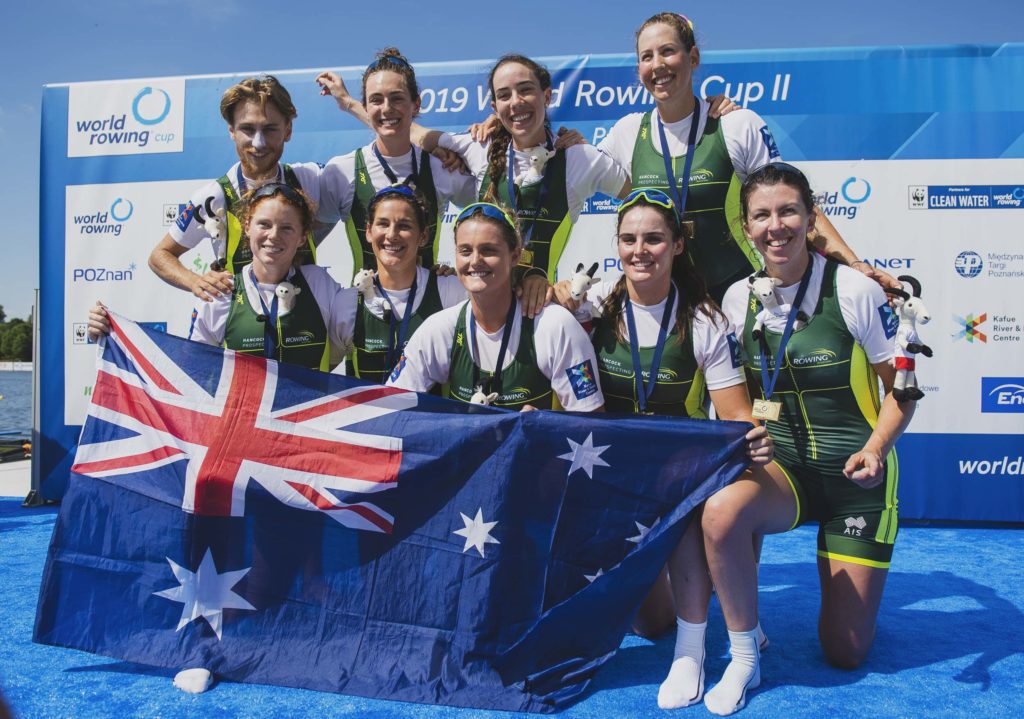
Photo AUS W8+ wins gold in Poznan
Credit Benedict Tufnell
There is no doubting the quality of Australia’s current men’s four: a flawless race from the front seeing them subjugate Italy into silver with local favourites Poland putting in a solid row for bronze. What happens next year could be anyone’s guess, with a return to the GBR/AUS rivalry yet again being on the cards, but this year the Australians have the event to themselves with Britain focusing on qualifying its men’s eight to defend the more complicated Rio title. The Australian men’s pair, too, is top drawer, and collected a straightforward gold in the absence of the Sinkovics, albeit pushed extremely hard by Kiwis Michael Brake and Thomas Murray (no relation) in the last few hundred metres. The Kiwi women’s pair of Grace Prendergast and Kerri Gowler reasserted some of their authority on this, the course where they set a world best time in 2017, fending off perky challenges from Australians Jessica Morrison and Annabelle McIntyre to claim gold. Although in front all the way and perhaps not in top sprint mode, the New Zealanders still had to work like stink to make sure of their win, and there may be an intense rivalry brewing between the two.
The men’s eights fell into a predictable pattern: Germany striding beautifully to take the first serious lead, and nearly getting clear water before Britain, Canada and New Zealand fought it out for the minor medals (the first two took silver and bronze). A lot of this was due to the Germans dealing better with an annoying head-wind which made for sea-rowing conditions in the first thousand before it dropped a little for the race to the line. Australia’s men’s eight were next, followed by a disappointed Italy who came last despite fielding a strengthened eight. Since the whole of the Dutch senior team was absent from Poland, that leaves AUS and ITA with a lot to do before they can count on reaching the top-five placing needed for Tokyo qualification. Oh, and eight-times Olympian Lesley Thompson-Willie, who has five Games and eight worlds medals, was back on the water, coxing the Canadian men. No woman has ever competed at nine Olympic Games…
The quads had variety: on one hand China strolling away with the W4x victory by clear water over Poland, while Poland captured a very popular M4x gold by 2 seconds, but no more. Their challengers, Australia and New Zealand (both looking in fine form) had it easier than expected when Britain’s foremost men’s sculling crew unexpectedly faded to fifth. The women’s doubles went to New Zealand’s Brooke Donoghue and Olivia Loe by half a beat (well, 0.27 seconds). They had been led early by Australia and USA1 but came through late in the race and then breathlessly held off a second USA1 charge from Cicely Madden and Gevvie Stone, who are now the formal US worlds crew and turning out to be serious contenders. Meghan O’Leary and Ellen Tomek, the other US double, came fourth behind Australia.
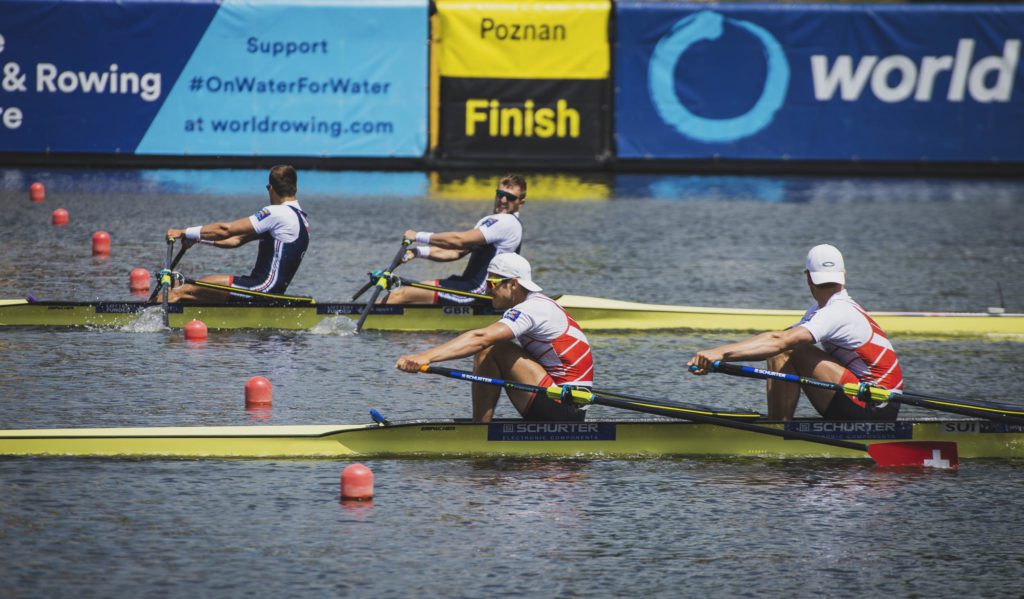
Photo GBR and SUI stare each other down on the line in the M2x final
Credit Benedict Tufnell
The men’s doubles was a barnstormer which finished with a similar rush: Britain bursting through Poland but then Switzerland springing a late surprise and bursting through the Brits with no more than ten strokes to go, perfect timing. The gold went to Switzerland by 0.21 seconds, and Germany beat Poland for bronze by only double that margin. Australia, who had looked strong, faded along with Lithuania but both could be dangerous in future.
Gallery: Poznan day 3 in pictures
Para-rowing sprang a bit of a surprise, as multiple world champion Erik Horrie (AUS) was comprehensively beaten by Roman Polianskyi (UKR), the one person the Australian can’t routinely count on defeating. Mind you, the last time this happened was in a world cup regatta — 2016 — Polianskyi went on to win the Olympic final too: quite an omen. Behind the two of them a British selection battle was shaping up nicely: long-time para-sculler Andy Houghton being pushed into fourth for the second time in the weekend by the newcomer he has advised and mentored, former road cyclist Ben Pritchard. There was considerably less of a surprise as Norway’s Birgit Skarstein won the women’s para-singles yet again, the Dutch won the para-doubles (yet again), and despite a flock of yelling Italian schoolkids the USA stayed narrowly ahead of Italy in the para-fours. The head-wind accentuated all margins on finals day, and it’s becoming increasingly clear that PR1 rowers with the biggest body-swing have a sizeable advantage over those with a shorter effective stroke. That must be depressing for those in the latter category.
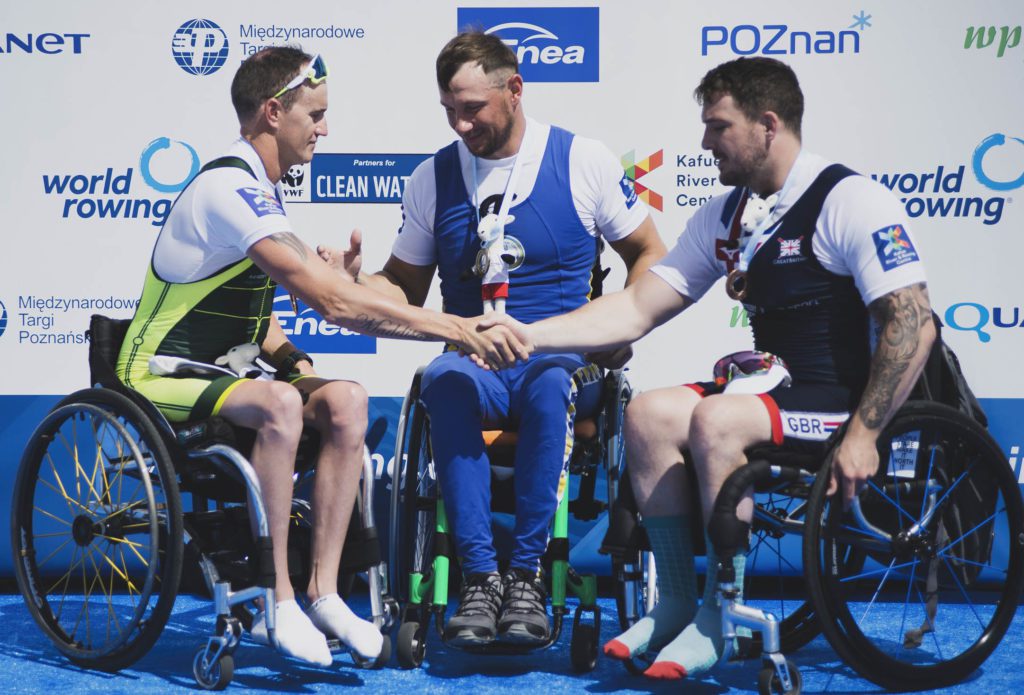
Photo Erik Horrie (AUS) was comprehensively beaten by Roman Polianskyi (UKR), Ben Pritchard (GBR) took bronze.
Lightweights may be beleaguered as a class, but on the water they are boiling over with energy despite the wind making conditions very tricky for them. Italian LM2x stroke Pietro Ruta (aka the Beardmeister) wth his partner Stefano Oppo seemed to have a stranglehold over the speedy Germans until a pre-1500m push by Jason Osborne and Jonathan Rummelmann seized them the lead and gave Germany gold with a row of intense determination. The women’s race was even closer: after early leaders China had been overhauled by Italy in the second half of the course, New Zealand came roaring through and battled neck and neck to the line for a photofinish. Confusion reigned when Italy were announced as the winners, only for the results to confirm New Zealand the champions, by a mere 0.09 seconds.
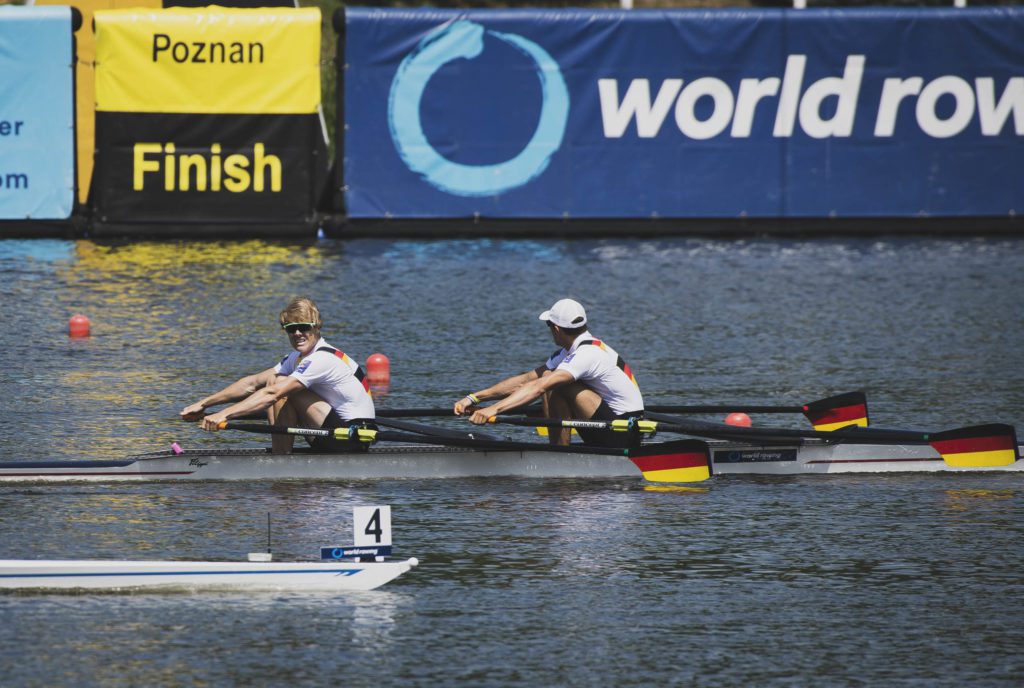
Photo Jason Osborne and Jonathan Rummelmann (GER) win the LM2x in Poznan
Credit Benedict Tufnell
World Cup 2 was fascinating, many categories having a lot of the biggest players present. But Romania and the Netherlands senior team were absent, together with some individual top crews, and most of the US team stayed at home as did Russia. In three weeks time (and after Henley Royal Regatta for those who are attending) we move to Rotterdam for the last round, combined with the Holland Becker regatta. And then it’s on to the worlds with a lot at stake for everyone.
